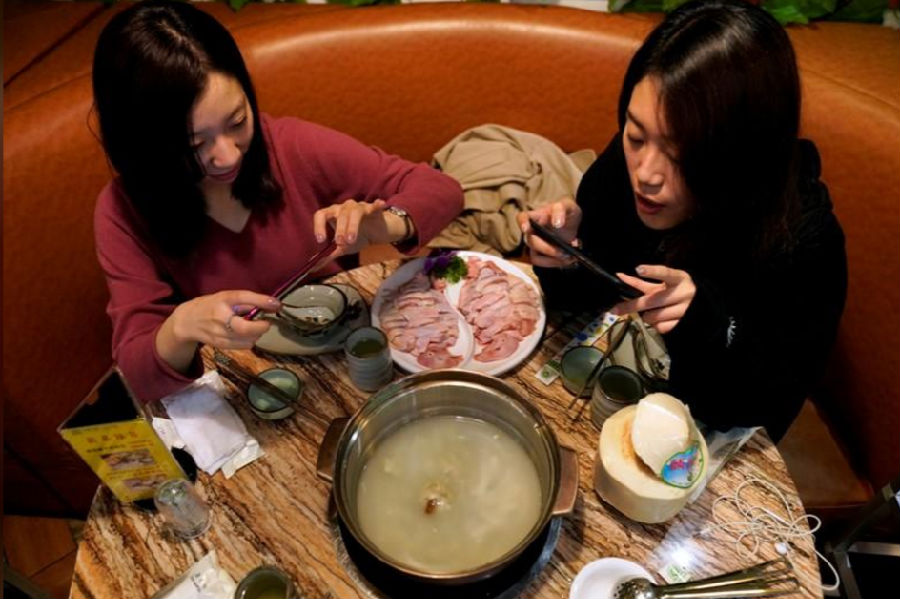(单词翻译:单击)
The stinky, spiky durian is set to become Malaysia’s next major export as the Southeast Asian nation rushes to develop thousands of acres to cash in on unprecedented demand for the fruit from China.
闻起来有点臭、满身带刺的榴莲将成为马来西亚的下一个主要出口产品,马来西亚正在大规模种植榴莲, 面积达数千英亩,希望从中国对榴莲前所未有的旺盛需求中赚取利润。
Once planted in family orchards and small-scale farms, the durian, described by some as smelling like an open sewer or turpentine when ripe, is attracting investments like never before. Even property tycoons and companies in palm oil, Malaysia’s biggest agricultural export, are making forays into the durian business.
有人将成熟榴莲的气味形容为露天下水道或松脂的气味,此前只在家庭果园和小规模农场中种植,如今吸引的投资规模可谓前所未有。就连房地产大亨和该国第一大出口农产品棕榈油的制造商都纷纷进军榴莲种植产业。
“The durian industry is transforming from local to global, large-scale farming due to the great demand from China,” said Lim Chin Khee, a durian industry consultant. “Before the boom, a durian farm in Malaysia would be a leisure farm ... Now they are hundreds of acres and bigger, and many more will come.”
马来西亚榴莲产业顾问林钦奇(音)说:“(马来西亚)榴莲产业正在从本土向全球转型,大规模种植源于中国的巨大需求,在这波热潮之前,马来西亚的榴莲农场本来是休闲农场……现在它们都是数百英亩,甚至更大,未来还会有更多的榴莲农场出现。”
Durian may be banned in some airports, public transport and hotels in Southeast Asia for its pungent smell, but the Chinese are huge fans. Durian-flavored foods sold in China include pizza, butter, salad dressing and milk.
尽管东南亚的一些机场、公共交通和酒店禁止携带具有刺激性气味的榴莲入内,但中国人却是榴莲的拥趸,在中国销售的榴莲风味食品包括披萨、黄油、沙拉酱和牛奶。
“At first, I also hated durians because I thought they have a weird smell,” said Helen Li, 26, eating at a shop specializing in durian pizza in Shanghai, where nearly every customer ordered the 60 yuan dish during a recent lunch hour rush. “But when you taste it, it’s really quite delicious.”
最近的一个午餐高峰时段,26岁的海伦·李(音)在上海一家主打榴莲披萨的餐厅吃饭,这家餐厅的几乎每位客人都点了一份60元的榴莲披萨。海伦·李说:“最初我也讨厌榴莲,因为我觉得它气味怪异,但吃起来,真的太美味了。”
At another Shanghai restaurant selling durian chicken hotpot for around 148 yuan, owner Chen Weihao said the store could sell around 20 to 25 kg of imported Thai durian every month.
而在另一家卖榴莲鸡肉火锅的上海餐厅,店主陈伟豪(音)说,他的餐厅每月能卖出20至25公斤左右的泰国进口榴莲。这家餐厅的榴莲鸡肉火锅每份售价约148元。
Chinese pay top dollar for Malaysia’s ‘Musang King’ variety of durian because of its creamy texture and bitter-sweet taste. Prices of the variety, now planted all over the country, have nearly quadrupled in the last five years.
中国人高价购买马来西亚的“猫山王”榴莲,这个品种的榴莲口感细腻、甜味里带着微苦,现在马来西亚全国各地均有种植。过去5年间,这个品种的价格翻了两番。
China’s durian imports rose 15 percent last year to nearly 350,000 tonnes worth $510 million, according to the United Nations’ trade database. Nearly 40 percent was from Thailand, the world’s top producer and exporter.
根据联合国的贸易数据,去年中国的榴莲进口量增长了15%,达到近35万吨,价值5.1亿美元(约合35亿元人民币),其中近40%来自泰国——世界最大的榴莲生产国和出口国。
Malaysia accounted for less than 1 percent, but expects sales to China to jump to 22,061 tonnes by 2030 from this year’s likely 14,600 tonnes, as trade is widened to include whole fruit from the current restriction to durian pulp and paste.
榴莲进口总量中来自马来西亚的不到1%。但目前马来西亚出口中国的仅限榴莲果肉和果酱,未来可能出口整果,预计到2030年,马来西亚对中国的出口量将从今年的14600吨左右增加到22061吨。
Lim, the consultant, said palm oil giant IOI Corp and property-to-resorts conglomerate Berjaya Corp have approached him about making ventures into durian farming.
林钦奇说,马来西亚棕榈油巨头凯业集团和房地产巨头成功集团都在向其咨询有关进军榴莲种植业的问题。
State-owned palm oil company Felda said the agricultural ministry began planting durian on its land this year. PLS Plantations last month said it will buy a $5 million stake in a durian exporter.
马来西亚国有棕榈油企业费尔达公司称,今年农业部已开始在其土地上种植榴莲,林蓬岸种植公司上月称,该公司计划出资500万美元购买一家榴莲出口商的股份。
M7 Plantation Bhd, a private company established last year, is developing a 10,000-acre durian estate in Gua Musang, home to the Musang King in the eastern state of Kelantan, and is selling durian trees for 5,000 ringgit each.
去年成立的私营公司M7种植公司正在东部吉兰丹州话望生的“猫山王”榴莲原产地开发一个占地1万英亩(约合4047公顷)的榴莲种植园,并以每棵5000林吉特(约合8292元人民币)的价格出售榴莲树。
“We founded the company because we see potential in the industry, the primary target being China,” Chief Executive Ng Lee Chin said, adding that most of her buyers were from China.
该公司首席执行官吴丽珍(音)说:“我们成立这家公司是因为我们看到了这个产业的潜力,我们的首要目标就是中国。”她补充说,大多数买家都来自中国。

“Planting durians is not just a hobby today as durians are considered as ‘gold’ in the agriculture industry,” the agriculture department said in e-mailed comments to Reuters.
马来西亚农业部在发给路透社的一封邮件中评论说:“如今种植榴莲已不仅仅是一种爱好,因为榴莲被视为农业的‘黄金’。”
Even Malaysia’s prime minister, Mahathir Mohamad, has seized upon it. “I feel it is time that we produce durians on a large-scale and systematic manner,” he has said.
连马来西亚总理马哈蒂尔·穆罕默德也看到了这一商机。他说:“我觉得是时候大规模有系统地种植榴莲了。”
Malaysia’s durian plantations covered 72,000 hectares last year but the area under cultivation is growing, the department said, and in some areas plantations growing palm oil are switching to durian because it is seen as more lucrative.
马来西亚农业部表示,马来西亚榴莲种植面积去年达到7.2万公顷,而且还在增加。在一些地区,棕榈油种植园也开始改种榴莲,因为利润更丰厚。
In March, Malaysia’s then-agriculture minister was quoted as saying one hectare of Musang King could yield nearly nine times more revenue than a hectare of palm plantation.
今年3月,媒体援引时任马来西亚农业部长的话说,1公顷猫山王榴莲的产值是1公顷油棕产值的近9倍。
In Sabah state, some of the land for durian farming will come from converting palm estates, its agriculture ministry said, adding it was planning expansion over 5,000 hectares.
马来西亚农业部称,沙巴州一些原本用于种植油棕的土地将改种榴莲,并计划将榴莲种植面积扩大到5000公顷以上。


